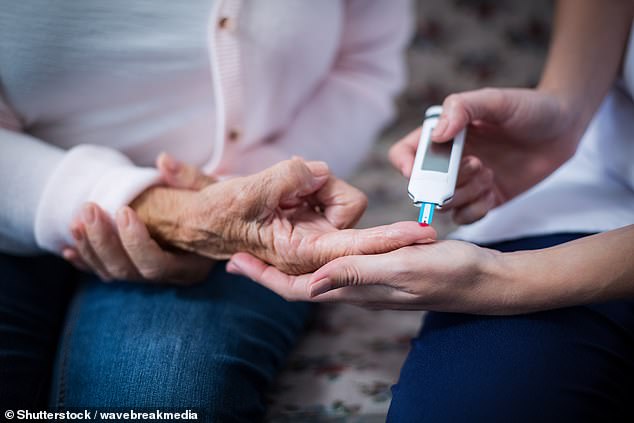Patients with Covid-19 and high blood sugar levels are twice as likely to die from the coronavirus than those with lower levels – even without a diabetes diagnosis, a study shows.
Researchers working in China looked back at patients admitted to different hospitals in Wuhan with high blood sugar levels who later died of the Covid-19.
Previous studies have shown a link between abnormally high blood sugar and a greater risk of death from pneumonia, stroke, heart attacks, trauma and surgery.
A link has also been shown between diabetes and a greater risk of death from Covid-19, according to the Huazhong University of Science and Technology team.
And the researchers say their findings show that, even without a diabetes diagnosis, high blood sugar is linked to a raised risk of dying from coronavirus.
They recommend hospitals introduce blood glucose level screening when patients are admitted with coronavirus symptoms.
A link has also been shown between diabetes and a greater risk of death from Covid-19, according to the Huazhong University of Science and Technology team. They recommend hospitals introduce blood glucose level screening (above, stock image) when patients are admitted with coronavirus symptoms
Naveed Sattar, Professor of Metabolic Medicine, University of Glasgow, not involved in the study, said the reports findings are in line with expectations.
‘We know, for example, that those with higher blood sugar levels will have more severe disease, because more severe disease will stress metabolic pathways more, leading sugar levels to rise in the sickest patients,’ Sattar said.
The Chinese team looked at fasting blood glucose levels at admission from January 24, 2020 to February 10, 2020 in two hospitals in Wuhan, China.
They also examined demographic and clinical data, 28-day outcomes, in-hospital complications and the severity of pneumonia in patients with the condition.
A total of 605 COVID-19 patients were covered by the study, including 114 who died in hospital – with an average age of 59 years.
Thirty-four per cent had one or more underlying conditions, but had not been diagnosed with diabetes, with high blood pressure being the most common.
Almost one third of patients had blood sugar levels so high that if they were constantly at that level they would be diagnosed with type 2 diabetes.
The results showed that patients in the highest blood sugar level group were 2.3 times more likely to die than those in the lowest, a statistically significant result.
Those in the middle group were 71 per cent more likely to die than those in the lowest group, although this result only had borderline statistical significance.
The data also showed that men admitted with higher blood sugar levels were 75 per cent more likely to die than women with similar levels.
The authors said they have shown high blood sugar levels are an indicator of a greater chance of dying from coronavirus or suffering complications from the virus.
‘These results indicate that our study included both undiagnosed diabetic patients and non-diabetic patients with hyperglycaemia caused by an acute blood-glucose disorder,’ the authors wrote.
‘Patients with conditions not related to diabetes, such as severe sepsis, systemic inflammatory response syndrome (SIRS) and traumatic brain injury tend to have abnormally high blood sugar.’
There were limitations to the study, for example the team didn’t have data on measures taken to lower blood sugar levels such as insulin and its impact.
‘What the authors cannot confirm is whether differential targeting of blood sugar levels in those admitted leads to differences in outcomes,’ Professor Sattar said.
‘It would be a step too far to assume from this study that targeting blood sugar more aggressively to lower levels than currently practised in hospitalised patients would make a difference.
‘Doctors are already testing sugar levels in such patients so this is not new either but whether these levels help determine outcomes when more clinical data are factored in, is also not certain.’

Based on their findings, the researchers say there is a link between increased risk of dying from coronavirus and high blood sugar even without a diabetes diagnosis
The authors suggest that possible mechanisms for this increased mortality include changes to the way blood clots form and the function of the walls of blood vessels.
The other major suggestion is the overproduction of inflammatory cytokines (small proteins important in cell signaling) produced by the immune system – the so-called cytokine storm.
‘In conclusion, a fasting blood glucose level of 7.0 mmol/l or higher at admission is an independent predictor for 28-day mortality in patients with Covid-19 without previous diagnosis of diabetes,’ the team wrote.
‘Blood sugar testing and control should be recommended to all Covid-19 patients even if they do not have pre-existing diabetes, as most Covid-19 patients are prone to glucose metabolic disorders.
‘During a pandemic of Covid-19, measuring fasting blood glucose can facilitate the assessment of prognosis and early intervention of hyperglycaemia to help improve the overall outcomes in treatment of Covid-19.’
The findings have been published in the journal Diabetologia.
